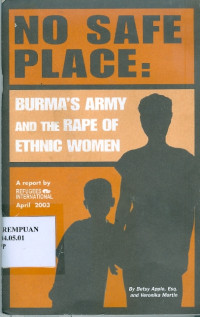
Text
No safe place: Burma's army and the rape of ethnic women ( A Report by REfugees International April 2003)
The specific rapes documented in this report are but a fraction of those perpetrated by Burma's army. Every one of the 45 ethnic women who participated in the RI focus groups said she had heard about rapes occuring in her area of origin, and a vast majority said they knew someone who had been raped. According to Burma's ruling military regime, the State Peace and Development Council (SPDC), Burma's army "safeguards national solidarity and peace." According to women from Burma's ethnic minority groups, particularly those living in the ethnic States along Burma's eastern borders, the army does the opposite. Rather than look to the army for protection, ethnic women flee in fear at the sight of a soldier. A recent investigation by Refugees International documents the widespread use of rape by Burma's soldiers to brutalize women from five different ethnic nationalities. Although rape by soldiers in Burma has been a well-known, well-documented problem for at least a decade, a recent report by the Shan Women's Action Network (SWAN) and Shan Human Rights Foundation (SHRF), License to Rape, inspired an unprecedented level of international interest and outrage. Finally, the tragedy of rape against Shan women in Burma is receiving the attention it deserves. It is, however, but one aspect of the problem. Burma's military (known as the Tatmadaw) frequently rapes women from other ethnic minority groups as well.
RI conducted interviews with individuals and focus groups of people living in refugee camps and in villages in Thailand, as well as people still living inside Burma. RI interviewed women, men, indigenous nongovernmental organizations (NGOs) and local leaders about sexual violence committed by Burma's armed forces against women from the Karen, Karenni, Mon and Tavoyan ethnicities (in addition to the Shan). In the course of 26 individual interviews with women and men and two focus groups composed of 45 women, RI learned about numerous instances of rape against ethnic women: specifically, 43 cases of rape or attempted rape against women from five different ethnic groups, with 23 of those confirmed through eyewitness testimony or physical evidence. In seven of the confirmed cases, the abuser raped the woman or women on military property, and in eight confirmed cases, he was an officer in Burma's army.
Availability
| KP.II.000411 | KP.II APP n | My Library | Available |
| KP.II.000411-01 | KP.II APP n | My Library | Available |
| KP II 01022 | KP.II APP n | Perpustakaan Komnas Perempuan (Perpustakaan Komnas Perempuan) | Available |
Detail Information
- Series Title
-
-
- Call Number
-
KP.II APP n
- Publisher
- Washington : Refugees International., 2003
- Collation
-
74p. ; 22 cm
- Language
-
English
- ISBN/ISSN
-
-
- Classification
-
KP.II
- Content Type
-
-
- Media Type
-
-
- Carrier Type
-
-
- Edition
-
-
- Subject(s)
- Specific Detail Info
-
-
- Statement of Responsibility
-
-
Other version/related
No other version available
File Attachment
Comments
You must be logged in to post a comment
 Computer Science, Information & General Works
Computer Science, Information & General Works  Philosophy & Psychology
Philosophy & Psychology  Religion
Religion  Social Sciences
Social Sciences  Language
Language  Pure Science
Pure Science  Applied Sciences
Applied Sciences  Art & Recreation
Art & Recreation  Literature
Literature  History & Geography
History & Geography